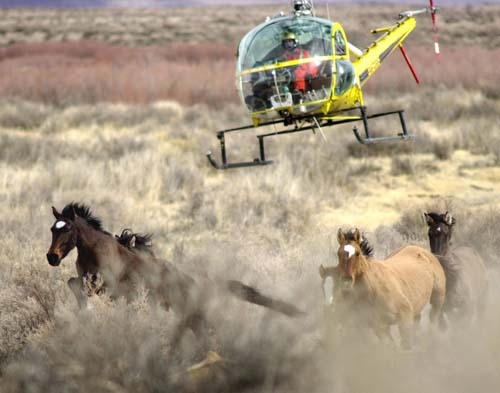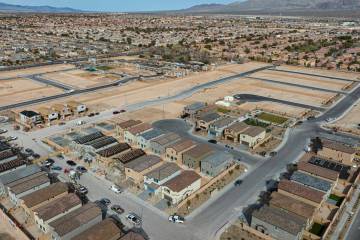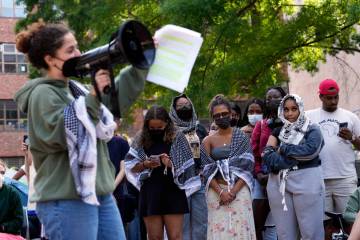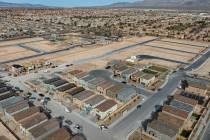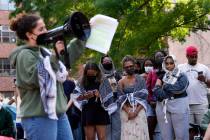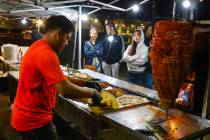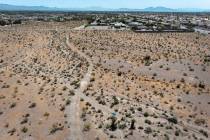Drought may force emergency BLM wild horse roundups
RENO - Extended drought in some parts of Nevada and the West might force a delay in the U.S. Bureau of Land Management's plans to ease up on wild horse roundups as more emphasis is placed on fertility control to keep herd populations in check.
The BLM plans fewer wild horse gathers in each of the next three years in the 10 western states that had an estimated 37,000 horses and burros as of February. The total population is 1,500 fewer than last year but 10,000 more than the agency maintains the range can sustain.
Raul Morales, the BLM's deputy director for natural resources and planning in Nevada, said the agency may have to resort to emergency roundups it has used in the past to rescue parts of herds already hurting for water in the Jackson Mountains and at least two other places in Nevada, which is home to about half the wild horses nationally.
A roundup already is planned in the Jackson Mountains about 150 miles northeast of Reno.
But Morales said nearly a third of the 600 animals in that herd might have to be rescued sooner if Mother Nature doesn't cooperate in the weeks and months ahead.
"We are praying for moisture, but we are on top of it," he told the BLM's National Wild Horse and Burro Advisory Board during a meeting in Reno on Monday.
BLM spokeswoman Heather Emmons said Tuesday that agency officials were making plans to haul in water for horses in the Jackson Mountains.
She said they are monitoring as many as a dozen herd management areas across the state, mostly in northwest and north-central Nevada and near Las Vegas.
"Everyone is on heightened alert," she said. "We're keeping pretty close tabs."
Ron Cerri of the Nevada Cattlemen's Association told the panel on Tuesday that he wanted to "commend BLM for getting out ahead of the problem" in the Jackson Mountains.
But Laura Leigh, director of Nevada-based Wild Horse Education, an Internet clearinghouse for information on roundups, said she opposes emergency roundups, especially in the Jackson Mountains.
If wild horses must be removed, she said, so too should a proportional number of grazing livestock.
"If 50 percent of the horses need to be removed due to the drought or an emergency situation, it should be expected the same restrictions would be on any and all permittees," Leigh told the panel Tuesday.
Rick Myers, a member of the Wyoming State Grazing Board, told the panel his state is "in the midst of severe drought." Parts of Utah, Arizona, New Mexico and Colorado also report drought conditions.
"I'm positive we are going to have more extreme conditions that are going to make for more gathers this year," Myers said Tuesday.
The agency has been forced to rein in its annual roundups because of the soaring cost of housing the animals: $44 million last year, 58 percent of its $77 million budget for the entire wild horse and burro program.
With 47,000 animals now in holding facilities and demand for adoptions waning, BLM plans to gather about 7,500 horses and burros in each of the next three years, compared with about 10,000 in each of the past two years.
Dean Bolstad, BLM deputy division chief for the national wild horse and burro program, said the agency intends to round up 7,600 animals in 2012 "unless we have some emergency gathers."
Boyd Spratling, the board's chairman, who is a veterinarian in Deeth, said the agency has made it clear for some time it's moving toward population control "as opposed to gathers and removal."
"Much more emphasis on that," Bolstad said. "It is the wave of the future."
Wild Horses: Unbridled Passions, Untamed Costs
Review-Journal in-depth series
Deeth vet named to panel
RENO - A longtime veterinarian from rural Nevada has been named the new chairman of the U.S. Bureau of Land Management's Wild Horse & Burro Advisory Board.
Boyd Spratling of Deeth has been practicing veterinarian medicine in Elko County for 35 years. He was appointed chairman Tuesday of the nine-member citizen panel, which makes recommendations to BLM for managing an estimated 37,000 wild horses and burros across 10 western states.
Julie Gleason of Las Vegas was appointed co-chair. She is a former member of the Nevada Commission for the Preservation of Wild Horses. She has adopted and fostered several wild horses herself.
Nevada is home to more than half the wild horses and burros on federal lands in the West.
THE ASSOCIATED PRESS



